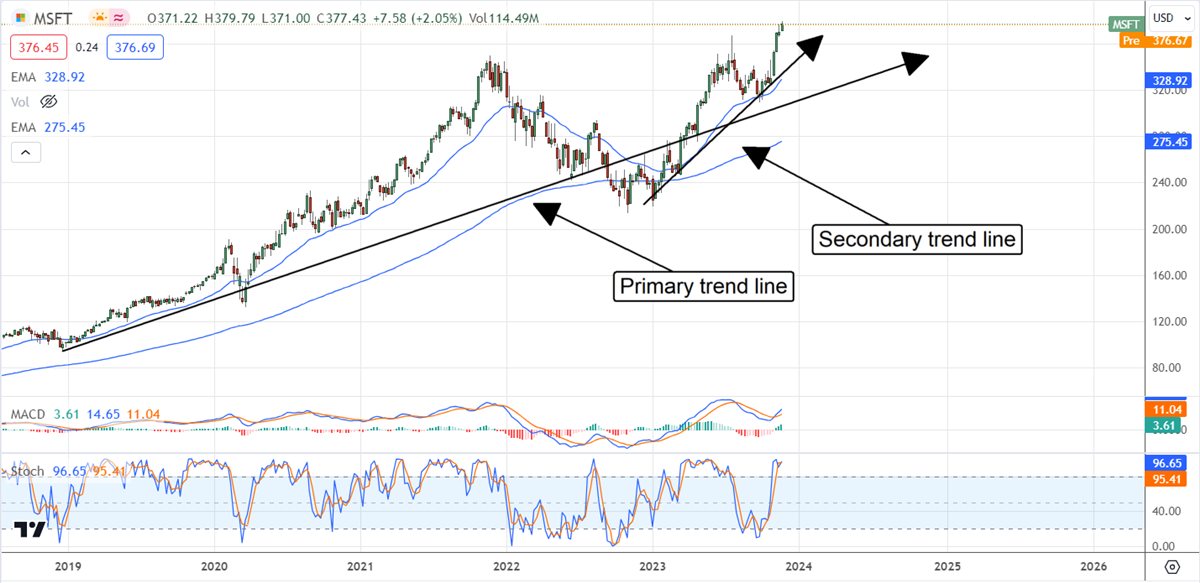- Microsoft announced its first-ever custom chips for cloud and AI services.
- The chips take a new approach to cloud infrastructure and will reduce dependency on NVIDIA.
- While a threat, the collaborative nature of AI advancement will keep NVIDIA in the top spot among chipmakers.
It is unlikely that NVIDIA Corporation (NASDAQ:NVDA) will lose its top spot in the AI world soon. The company has too big a lead and too much market share to fall by the wayside without some fundamental shift in the landscape. However, losing market share to competitors like Advanced Micro Devices Inc (NASDAQ:AMD) and Microsoft Corporation (NASDAQ:MSFT) is an equally significant risk.
The AI market, including chips, infrastructure, and services, will continue to grow, but loss of market share would provide an unstable footing for NVIDIA that will weigh on the market over time.
Microsoft is best positioned to disrupt NVIDIA’s hold on the AI market. It provides a significant portion of cloud services to the Internet and is gaining market share from AWS NASDAQ: AMZN because of its utility to AI. It now focuses on proprietary microchips, and more competition for NVIDIA will undoubtedly arise.
The caveat for investors is that much of the cloud and AI is built on collaborative efforts that include hardware, software, and services from multiple vendors. Microsoft is building some chips but isn’t severing ties with NVIDIA or Advanced Micro Devices; it’s building on existing partnerships to advance AI infrastructure and services for all.
Microsoft aims at AI dynasty, takes a new approach to the Cloud
Microsoft announced its Azure cloud architecture's first two custom chips in early November. The chips are slated to come out in 2024 and will reduce dependency on NVIDIA but not erase it. The chips are a new approach to the cloud that aims to reduce power use, improve efficiency and lower costs by optimizing Microsoft’s cloud and AI stack from bottom to top.
The chips, Azure Maia 100 and Azure Cobalt 100 are cloud- and AI-specific and intended to be a launch pad for future AI development by Microsoft and its clients. The Cobalt 100 is a CPU for general cloud services with a 128-core Arm Neoverse base customized for Microsoft.
The MAIA 100 is an AI accelerator for running large workloads, such as training LLM, including the models used by OpenAI, a collaborator on the project. OpenAI is working with Microsoft on the systems' design and testing, which is underway now.
However, this doesn’t mean NVIDIA or Advanced Micro Devices will be removed from the Microsoft cloud picture. Microsoft uses and will continue to use NVIDIA and AMD microchips, GPUs and accelerators in its cloud infrastructure.
Likewise, NVIDIA is running its generative AI foundry service on Azure. The service provides a platform for businesses to customize AI models and is already in demand. The biggest takeaway from MSFT’s decision is that the new chips and infrastructure will aid AI inference and the AI industry.
Analysts drive Microsoft to new highs
The analysts weren’t moved by the chip announcement but rather by the OpenAI debacle that left the company and Microsoft in a better position than before. The botched ousting of Sam Altman resulted in a new, stronger board of directors and the reinstatement of Mr. Altman to the helm.
Dan Ives of Wedbush called it a Cinderella ending for the company, reiterating an Outperform rating and a $425 price target. That target is well above the consensus estimate of $388, which assumes fair value at current market pricing and raises the consensus target. The consensus price listed by Marketbeat.com is up nearly 30% compared to last year and trending higher following the latest earnings release. In that report, Microsoft outperformed expectations and raised guidance on strengths in Azure and cloud services.
The Technical Outlook: Microsoft hits new high, new highs on deck
The price action in Microsoft confirmed the primary uptrend with a bounce that began following the Q3 earnings release. The market advanced more than 15% to break above the all-time high and set new highs for three consecutive weeks. The indicators confirm the move, consistent with a trend-following action, but now show an overbought market. The overbought condition could lead to a price correction, but a consolidation is more likely. The market may pull back modestly in that scenario before finding support and moving higher. 
